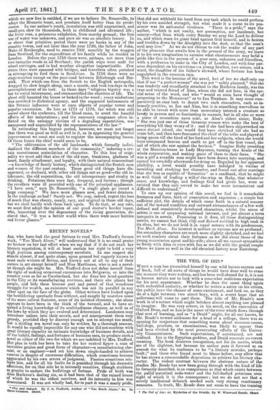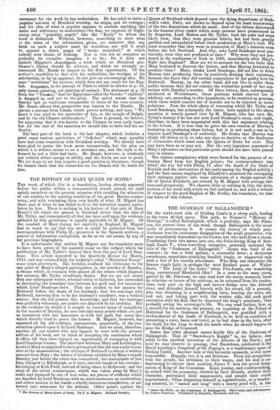THE VEIL OF I SIS.*
WHEN a man has committed himself by one wild harum-scaram sort of book, full of all sorts of things lie would have done well to erase the moment they were written, and has been well abused for it, it is not in human nature not to look with a somewhat malicious expectation for his next appearance. Whether he does the same thing again with redoubled audacity, or whether he writes a satire on his critics, the public have the chance of some excitement, and look on, as they do at a fight between two street boys, with a secret hope that no policeman will come to part them. The title of Mr. Reade's new work is of a nature which might betoken almost anything one pleased to imagine. He was very severe, in his novel, on the enormities of Oxford Dons, and as Isis is the name of the river which flows through that seat of learning, and as "a Druid" might, for all one knows, be Mr. Reade's newest nickname for a head of a college, there was an opening for conjecture that something worse about common-rooms, bull-dogs, proctors, or examinations, was likely to appear than had been elicited by the most persevering efforts of the Univer- sity Commissioners. Such expectations, if entertained, are not realized. Isis is the Egyptian goddess, and Druid conceals no covert meaning. The book deserves recognition, not for its merits, which are of the slightest, but because its author puts it forward as an amende for what he confesses to be "a literary mistake, perhaps fault;" and those who found most to blame before, may allow that he has shown a commendable disposition to retrieve his literary cha- racter. The violent contrast between the abstruse nature of the studies Mr. Reade has now beengoing through with the kind of life he formerly described, is as conspicuous as that which exists between the pallid matutinal soda-water and the full-bodied potations over night of which it is the consequence ; but we do not see that a merely intellectual debauch needed such very strong reactionary measures. In truth, Mr. Reade does not seem to have the training • The Veil of hit; or, Mysteries of the Druids. By W. Winwood Beetle. Skeet necessary for the work he has undertaken. He has tried to write a popular account of Druidical worship, its origin, and its vestiges ; and his idea of what is popular appears to exclude anything like notes and references to authorities—for fear, we suppose, of fright- ening away " guardian angels" like the " Emily" to whom the book is dedicated. Without, however, something to show what is the value of the information given, we conceive that any book on such a subject must be worthless, nor will it avail to append a dozen pages of " works consulted," at which nobody ever thinks of looking. Nor is this list as complete as probably its compiler imagines it to be ; for it does not include Higgins's Anacalypsu, a work which no Druidical gen- tleman's library should be without, and which we strongly re- commend Mr. Reade to inspect on the first opportunity. Of the author's capability to deal with his authorities, the vestiges of his scholarship, so far as apparent, do not give an encouraging idea. He uses " noviciates" for novices, which does not say much for his Eng- lish. zorypaola, in the passage of Plato to which he alludes at p. 59, only meanspainting, not painting of animals. The statement at p. 79 from the " Timmons," that the Egyptians called the Greeks " children" is dragged in, and not to the point. The priest meant that the Greeks had no traditions comparable to those of his own country. Mr. Reade affirms that gunpowder was known to the Druids. He quotes a passage from Luean, which proves nothing, and says, " We know it was used in the mysteries of Isis, in the temple of Delphi, and by the old Chinese philosophers." There is ground, we believe, for supposing that it was known to the Chinese in very early times, but for the rest of the assertion we should like to have had his au- thority.
The best part of the book is the last chapter, which includes a good many curious particulars of "folk-lore" which may possibly have had some connexion with Druidical worship. We should have been glad to praise the book more unreservedly, but the plan on which it is written seems to us a mistaken one, and the style is de- formed by not a little bad taste. Mr. Reade, however, is evidently not without either energy or ability, and his faults are not in grain. We yet hope to see him acquire a good position in literature, though we cannot think that his researches on the Druids will do much for him.































 Previous page
Previous page